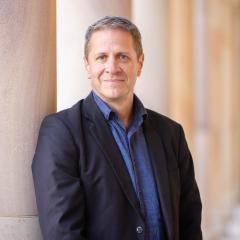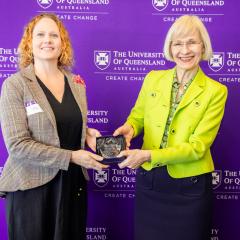KEY OUTCOME
CPF's work with The Pacific Community (SPC) was developed into a strategic foresight toolkit that was rolled out across the Pacific.
‘The Pacific Pathfinder: a toolkit to imagine and create futures’ was launched to representatives of the 27 countries and territories that govern SPC at the 23rd meeting of the Committee of Representatives of Governments and Administrations. The full toolkit can be found here.
Dr Ray Maher, from the Centre for Policy Futures, collaborated with members of The Pacific Community (SPC) to co-design SPC’s 10-year Strategic Plan. This work also developed Pathfinder Pacific, a toolkit that combines academic scholarship with unique Pasifika knowledge to guide decision-making processes.
THE RESEARCH
The Pacific region and the Pathfinder Pacific project
The Pacific region comprises 22 countries and territories, 12.3 million people, 1200 languages, 30% of the Earth’s surface, and an array of diverse cultures with close ties to the ocean (Pacific Community 2020b).
These countries and territories are geographically dispersed and culturally diverse, but they share the objective of securing a sustainable future for the region. Issues such as climate change, growing populations, resource management, the demand for quality urban infrastructure, and the expansion of telecommunications have brought both advantages and challenges to the Pacific.
To navigate these and other issues, The Pacific Community (SPC)—a multilateral organisation that has supported sustainable development in the region since 1947—partnered with researchers in the Centre for Policy Futures to develop the organisation’s 10-year Strategic Plan. Developing a robust Strategic Plan demanded integration of knowledge from across the organisation and UQ experts. To facilitate this, the team developed a foresight and knowledge-sharing toolkit called Pathfinder Pacific.
Pathfinder Pacific: A collaborative toolkit to guide decision-making in the Pacific
The Pathfinder Pacific toolkit amplifies Pacific knowledge to navigate futures changes and challenges, and directly contributes to the sustainability of the Pacific region, its people, cultures, and environments. This future-orientated toolkit helps users to identify emerging issues, integrate different perspectives, explore future scenarios, and design pathways to support strategic decision-making surrounding sustainability in the Pacific. Using the Pathfinder Pacific toolkit to integrate knowledge from 152 SPC staff members and 8 UQ experts helped to identify significant trends shaping the future of the Pacific.
Outputs from Pathfinder activities have been applied to:
- SPC’s 10-year Strategic Plan;
- SPC’s whole-of-organisation COVID-19 transition plan;
- Internal division business plans; and
- Contributed to the 2050 Strategy for the Blue Pacific Continent – a regional strategy led by the Pacific Islands Forum.
Identifying forces driving change in the Pacific to support a robust strategic plan
Through the workshops and activities, Pacific experts identified a set of 600+ Pacific-orientated drivers of change, and SPC staff built their capabilities in futures-thinking and scenario-development which enabled them to action their 10-year Strategic Plan. Whilst the Pacific faces familiar global trends, the nature of the Pacific region comes with unique challenges, opportunities, and priorities. As in the rest of the world, climate change remains a central issue, yet it has significant ramifications for cultures and societies which are founded on connections with the ocean. For example, whilst Pacific nations contributing less than 1% of global Greenhouse Gas Emissions, 98% of coral reefs may suffer permanent degradation by 2050 with severe implications for marine life and food security. Growing populations also make sustainable resource management difficult, and rapid urbanisation has increased demand for quality urban infrastructure (United Nations Habitat Regional Office for Asia and the Pacific 2019).
Other changes have benefitted the region while simultaneously presenting new challenges. Rapid developments in communications and technology provide access to information and enable new ways of working while disrupting business practises and cultural norms, and travel restrictions have curbed the spread of the COVID-19 pandemic but also led to significant decline in key economic sectors, especially international tourism.
Combining strategic foresight methods and Pacific ways of knowing: a collaborative methodology
Securing a sustainable future for the 22 countries and territories that make up the Pacific region means placing their interconnectedness at the centre of decision making (Pacific Community 2020a, 5). The Pathfinder Pacific was developed in and for the benefit of Pacific Island states, and Pacific people were directly involved in project leadership and design, session facilitation, and as participants in all activities. Local ownership, social learning, and trust were all integral to the development of the toolkit. The methodology employed integrates Pacific wisdom and ways of knowing, such as talanoa, described a “personal encounter where people story their issues, their realities and aspirations” (Vaioleti 2006). Reciprocity is of significance in talanoa, so the direct and meaningful engagement of Pacific communities and the sharing of findings for other Pacific Islands was crucial in the research process.
Alongside Pacific knowledge, the toolkit also employed strategic foresight methods—conducted through a suite of five collaborative online activities—to make sense of the many forces shaping the future of Pacific nations and communities. Prior to commencement of activities, a webinar introduced the purpose of strategic foresight, its value in navigating disruption toward preferred futures, and its application to SPC’s Strategic Planning process. The activities took the form of small-group discussions where sharing and equal participation was fostered, and where space for diverse perspectives of various futures facilitated participation and local ownership. This process agrees with the emphasis on discussion and relationship building in the generation of Pacific knowledge (Sanga and Reynolds 2020).
Future application of foresight and Pathfinder Pacific
Pacific Pathfinder fills a gap in strategic foresight research related to Pacific Island states and provides an example of a blended research approach of Pacific methods with strategic foresight and systems thinking in an online format. This will be especially valuable for future work as issues such as climate change continue to escalate in the region. Similar collaborative approaches using foresight, systems thinking can support organisations anywhere to understand emerging issues and position themselves to thrive despite uncertain futures.



